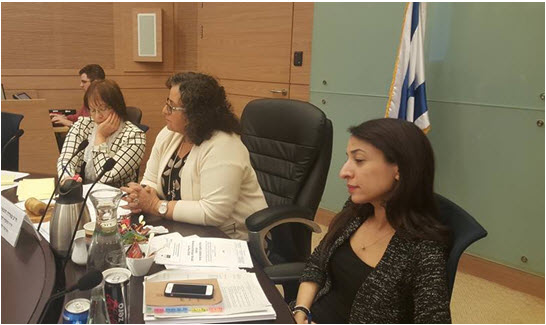Data presented on Monday, August 1, to the Knesset Committee on the Status of Women, showed that the rate of employment among Arab women between the ages of 25 and 64 in Israel decreased in 2015 to 31.5% from 32.3% in 2014, after having risen to the latter level from about 30% in 2013. Thus, the improved trend in employment figures between 2013 and 2014 seems to have been halted. The gap between working Arab and Jewish women in Israel also remains vast, with 80% of the latter group being employed.

MK Touma-Sliman (center) at a meeting of the Knesset Committee on the Status of Women (Photo: Al Ittihad)
The study was conducted by Shelly Mizrahi-Simon of the Knesset’s Research and Information Center at the request of the chairwoman of the Committee on the Status of Women, MK Aida Touma-Sliman (Hadash – Joint List). Among other factors, the study attributes the low rate of employment among Arab women to “a lack of local jobs, flawed public transportation and social barriers such as objections to female relatives working.” According to the data gathered for the study, the rate of Arab women employed only part-time, despite being ready for full-time employment, is more than three times greater than the rate among their Jewish counterparts, 35% versus 11%. On the average, in 2014 Jewish women earned 45% more than Arab women 7,663 shekels versus 5,271 shekels. Regionally, the study found that the rate of Arab women working is 20% in Jerusalem and the south, 19% in Tel Aviv, 39% in Haifa, 34% in the north, and 36% in the center.
The committee’s meeting focused on the employment of female Arab university graduates. “Arab women want to work, and the state has already been convinced of this, but it has yet to be convinced that we have the necessary skills to work in all professions,” said the committee’s chairwoman, MK Touma-Sliman. “The Ministry of Economy is using only 28% of its budget to advance the employment of Arab women, and the Health Ministry has used only 7 of the 20 million shekels at its disposal towards this end,” she added. “We want to achieve our rights, but we are nevertheless being denied an important path to exit the cycle of poverty.”
MK Yousef Jabareen (Hadash – Joint List) added, “Focusing on the public service sector reveals the governmental failure. Only now has the 2010 objective been achieved – 10% of workers in the civil service are Arab.” Hadash MK Ayman Odeh (Joint List) noted, “The state of every society is measured by the status of its women, and the key to progress and development is work. One week after the so-called “apology” by the Prime Minister [to the Arab community], there are no representatives from the coalition attending this meeting.”
Ron Gerlitz, the co-executive director of Sikkuy – The Association for the Advancement of Civic Equality, said that “The discussion focuses on the problem of supply, and less about how to produce demand in the personal work market. If the country wants to promote Arab employment, we must make a change.” Concluding the discussion, committee chairwoman Touma-Sliman said, “We must develop a plan that will bring about the sharing of information among all government ministries, in order launch a serious employment market for Arab women. It appears that only a decision by the Ministerial Committee will be able to achieve this.”


